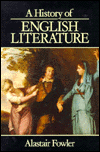

 |

|

The average rating for A history of English literature based on 2 reviews is 4.5 stars.
Review # 1 was written on 2017-11-02 00:00:00 Kathy Westling Kathy WestlingExcellent overview of the themes and cultural developments that drove the evolution of English literature. This is a delightful book to read; it is simultaneously engaging and deep. This book would be best read in conjunction with a good anthology such as Norton’s five volume English literature set; very little source material is included in this work and it mostly refers to source works. |
Review # 2 was written on 2017-08-09 00:00:00 Thomas Riddle Thomas RiddleSpeaking of his[Abraham Cowley] collection of poems, The Mistress, published in 1647, Dr. Johnson remarked that it had, "no power of seduction. Her beauty and absence, her kindness and cruelty, her disdain and inconstancy, produce no correspondence of emotion. His poetical account of the virtues of plants, and colours of flowers, is not perused with more sluggish frigidity. The compositions are such as might have been written for penance by a hermit, or for hire by a philosophical rhymer who had only heard of another sex." I- had uncontrollable laughter in me as I read one of the most creative roasts, thinking to myself, "it's okay, Cowley, that's just Johnson's opinion" but right after this- The modern critic is not disposed to quarrel violently with Johnson's judgement, Daiches throws that sucker punch with real British humour. Never a dull moment there. *** This was around a particularly oppressive and volatile time of Marian persecutions. The bishops eventually set up machinery to silence their critics, controlling both the press and the pulpit, but no sooner was the machinery completed when the anonymous pamphleteer who called himself Martin Marprelate began to issue his series of spirited attacks on the bishops. These pamphlets, which appeared in 1588 and 1589, have tremendous vigour; popular in style, colloquial in speech, full of witty taunts, vulgar jeers, and all the humourous rhetorical tricks of an expert street-corner orator, they introduced a new manner into religious pamphleteering. Martin Marprelate was never discovered, yet the printers were caught and that put an end to the pamphleteering. But the bishops had been disturbed. My man Martin definitely got that BDE. The History of English Literature is wild. From Bible translators getting burned at the stake to 20th-century artists shaking up the foundations with new theories. There is so much I don't know still. Getting started with the Daiches books was a daunting task. And I am going to read them again- and again- until the least I can do is quote my favourite parts. ** [edited] added the progress updates- March 1, 2021 – page 52 9.56% "This book is called Orrmulum, because Orm made it. -This is the first of the ten thousand extant lines of the poem (fortunately, only about one-eighth of the whole survives),... -Daiches on Orm" March 2, 2021 – page 79 14.52% "Once the Middle English writers had learned rhyme, nothing could stop them, and a didactic writer or long-winded romancer given his head in a clippety-clop meter was very hard to stop. -Daiches introducing Cursor Mundi. I remember laughing aloud on this two years ago the same way I did today. I just might be easily amused. I do enjoy them octosyllabic couplets though, especially Havelok the Dane." [personal favourite] May 5, 2021 – page 309 56.8% ""What could be done that would make any difference-any difference at all to the things that really mattered? [...] This is a tragedy of moral frustration. What are you going to do about past crimes which have shattered your preconceptions about the nature of life? There is nothing you can ever do about the past, except forget it. And yet, of course, Hamlet could not forget." Daiches on Hamlet." May 10, 2021 – page 428 78.68% "This "Defence of the English People" is a detailed and scornful reply to Salmasius, mingling legal, historical, and moral arguments with fierce personal attacks on the character, scholarship, and grammar of Salmasius. - Daiches on Milton, when Salmasius was commissioned by Charles II to write a public attack on Latin. What a flex by Milton. It is deliciously funny to me. He didn't even leave the grammar out. Legend." |
CAN'T FIND WHAT YOU'RE LOOKING FOR? CLICK HERE!!!